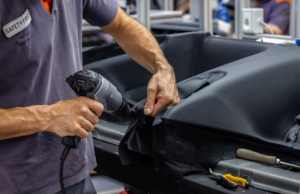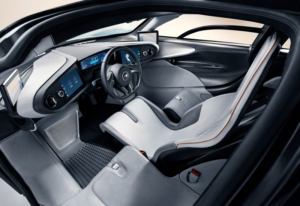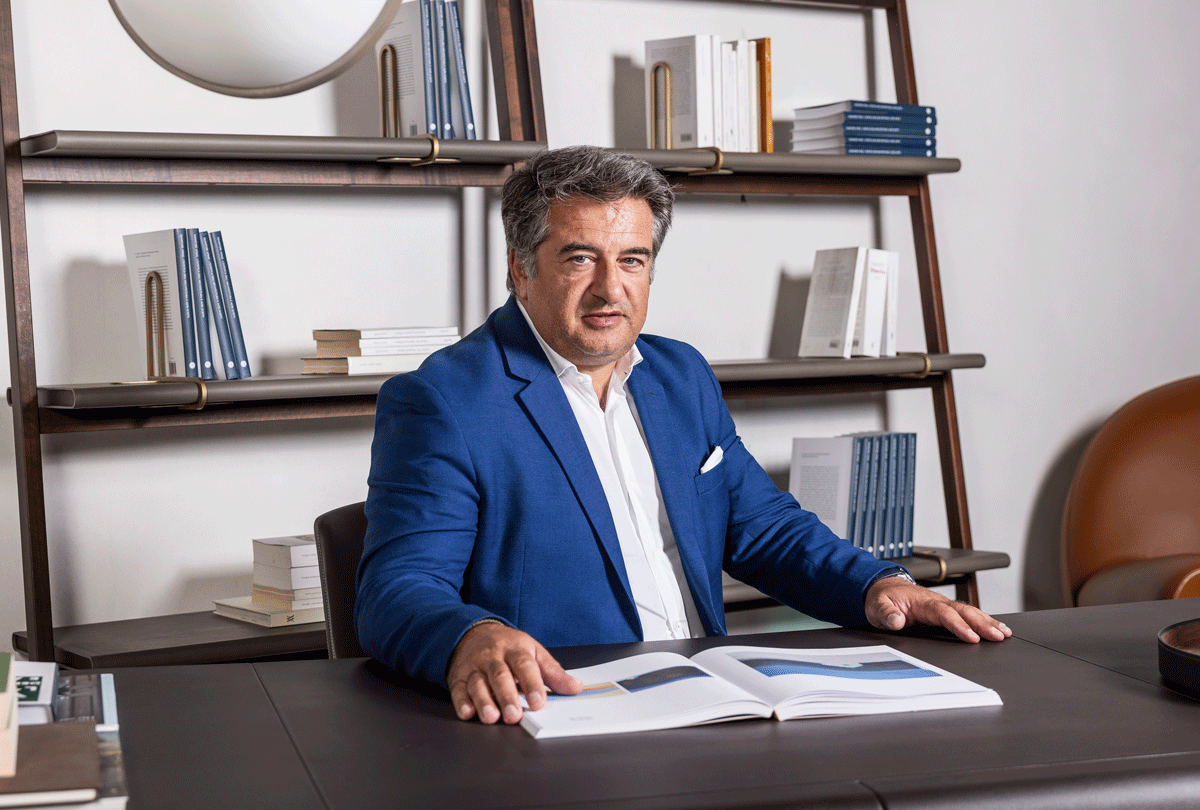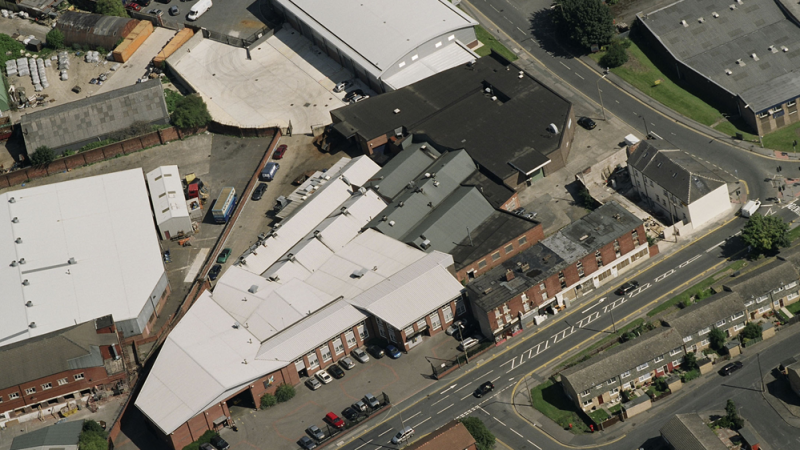Poltrona Frau is an Italian company that manages over a dozen flagship stores in many of the most important cities in the world, and boasts a network of over 450 points of sale across the globe. It belongs to Haworth Group, a US Company that has been leading the office furniture market since 1948. The story of Poltrona Frau begins in 1912, when the Sardinian entrepreneur Renzo Frau registered the name in the city of Turin.
“He was in love with the style of furniture that was typical of the English style aristocracy at the time. The sort of furniture you would see in gentlemen’s clubs and so on,” says Giovanni Maiolo, Director of the Business Unit Interiors in Motion sector of Poltrona Frau. “He founded this company to design his own collection, and it rapidly gained popularity. Soon Poltrona Frau was the official furniture provider for the Italian Royal Family, and continued to grow for many years. It became the standard for luxury while we still had a monarchy.”
Of course, a lot changed with the Second World War and after a series of crises, the company was facing bankruptcy by 1963. But in the face of that crisis, one of Poltrona Frau’s major creditors, a family-owned Italian tannery, saw an opportunity.
“They were well-known in the small leather goods industry, and they decided to buy the Poltrona Frau brand, employing a single member of staff to put together a new collection,” Maiolo says. “That person trained a new generation to produce furniture. They convinced a first-time designer, that until that period had never designed furniture, to create a collection to be sold in the luxury market segment all over the world.”
In 1968, Poltrona Frau embraced the opportunity to collaborate with some acclaimed Italian designers. It was a venture that led to some iconic products, among them the Dezza armchair, designed by Giò Ponti, and the Lullaby bed, designed by Luigi Massoni. This radical transformation of Poltrona Frau’s product range, coexisting with the brand’s more traditional designs, generated the distinctive trademark identity of the Poltrona Frau brand that persists today.
The collection was a hit, and once again Poltrona Frau was a byword for luxury, this time intrinsically associated with high quality leather. Even today, the majority of customers desire Poltrona Frau for their product lines in leather. From there the company has continued to expand, launching three key business units. The first, and most well-known, is the Residential Business Unit, famous for its luxury furniture, accessories and compliments. The second business unit, Custom Interiors, is specialized in small to large scale public spaces and collaborate with the world’s most prestigious architects and studios. This unit is less well-known, but no less prestigious, producing seating systems and interior solutions for many public buildings such as the European Parliament, the Shakespeare Theatre in Stratford Upon Avon, the Walt Disney concert hall in Los Angeles and several Opera houses. Last but not least is the Interiors in Motion Business Unit, led by Giovanni Maiolo. This segment of the business was born in 1984. Its first project was the Lancia Thema with an 8.32 Ferrari Engine, where Gianni Agnelli, FIAT’s former owner, wanted to reach the same elegance and comfort he had seen in the Poltrona Frau armchairs of his own living room.
Today this business unit covers several sectors, from Automotive where it manufactures and upholsters interior components such as headliners, pillars, dashboards, door panels, and centre consoles, to Yachting and Aviation luxury classes for seating.
“We have collaborated with Singapore Airlines for their first-class cabins. We do the seating systems for all the top-end manufacturers in the automotive sector,” says Maiolo. “We can say we are probably one of the most important producers of interiors in the luxury field. We have supplied the interiors for most cars over £100,000. Ferrari is historically our most important customer in that market. We have also worked with Land Rover since 2008, and we are supplying important products for the new Range Rovers. In the UK we are also working with Maclaren and Aston Martin.”
Poltrona Frau Interiors in Motion is responsible for providing a complete range of services, from design to product development, from test validation to project management, and offering innovative technical solutions for the creation of products of the highest quality.
It helps its customers create exclusive and unique interiors for cars, aircraft and boats.
 The Complexity of Luxury
The Complexity of Luxury
Poltrona Frau has grown to dominate the luxury sector of the market. The Interiors in Motion business unit is now worth 120 million euros and employs approximately 600 people. But the luxury sector also comes with unique challenges. While the production runs may be significantly shorter than in the mass-market sector, maintaining the necessary quality levels at volume is still a challenge.
“In the luxury segment, you need to be able to handle complexity, providing high quality at sufficient volumes,” Maiolo points out. “In a single day, you might need to do the interiors for three fully bespoke cars, but we have to do that to the highest production standards. When you want to do personalisation and volume simultaneously, we are the only ones who can manage that.”
Poltrona Frau is able to provide these levels of complexity and volume because it carries out most of its activities manually.
“We have automated some processes which allow us to be competitive, but for the personalisation, we provide manual work,” Maiolo tells us. “We look for areas where we can add value and create distance between ourselves and the competition.”
Best of the Both Worlds
When it comes to providing that level of hands-on skill, Poltrona Frau’s location is a huge boon. Its facilities are in close proximity to those of Gucci and Prada. They work at the cross section of several supply chains providing unique and specific applications around luxury leatherware, with a lot of opportunities to add value.
“Poltrona Frau facilities are located in a region imbued with manufacturing tradition in the world of leather,” Maiolo says.
While Poltrona Frau is a quintessentially Italian company, in recent years it has established a new facility in the UK.
“Joining forces with Poltrona Frau and Haworth Lifestyle makes me very confident that the skills, know-how and credibility I have built over 40 years of work in the sector have found the best possible platform to be nurtured and expanded in the future,” said KJ Ryan Founder Kevin Ryan.
“With this acquisition, we will be able to replicate the same organisation we have in Italy in the UK,” Maiolo tells us. “There will be a few synergies in terms of safety parameters, but at the same time, we have carried out so much investment in Italy that it will be necessary to keep some of our parts production on our side. We aim to replicate those processes and that expertise here, working with the local supply chain and with most of our staff employed locally. The goal is to create an autonomous branch to supply UK customers with the same philosophy we have in Italy.”
 Italy and Great Britain both have firmly established manufacturing cultures. Bringing those cultures together opens up some exciting opportunities.
Italy and Great Britain both have firmly established manufacturing cultures. Bringing those cultures together opens up some exciting opportunities.
“I believe there are a lot of advantages in merging British and Italian manufacturing culture,” Maiolo says. “Basically only Italy and the UK have that experience manufacturing for the luxury segment. Elsewhere, the maximum standard you will get is premium. So it was a natural part of our strategy to establish a presence in the UK after Brexit because it makes it easier to approach the customers here.”
Maiolo is passionate about the opportunities for cross-fertilisation between Italian and British manufacturing that could open up new possibilities for innovation and service.
“It makes it possible to get in contact with the best professionals with a lot of experience, and from our side, that means we can provide a different offering to many of our competitors,” Maiolo says. “What we have in the UK are small companies that can support low volume one-offs, or multinational companies that are used to working with much larger volumes, and the natural impact that has on service and cost. We can be much more flexible than the bigger firms in the UK but produce in volumes that smaller competitors cannot.”
The lessons learned from this cross-pollination are ones that can be taken further afield, as Maiolo points out, “Moving into Britain is a chance to build up new knowledge and new practices that we can then share around Europe.”




